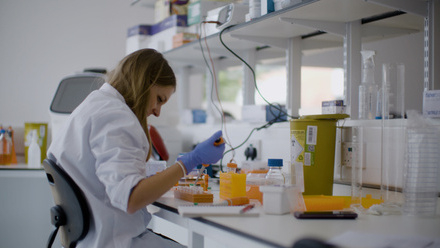Scaling up advanced therapy manufacturing in the UK: conversation with Ed Samuel

From scaling up advanced therapy manufacturing to harnessing the power of digital and automation, Ed Samuel, the new COO of the CGT Catapult, discusses how collaboration and innovation will shape the next phase of the UK’s cell and gene therapy ecosystem.
What will be your immediate priorities as COO?
As COO, I am responsible for the CGT Catapult's Manufacturing Innovation team and Good Manufacturing Practice (GMP) facilities in Stevenage and Braintree. These facilities provide a space for us to work with industry and drive innovation through collaboration to support process development, early clinical stage manufacturing and accelerate commercial-scale production.
I am extremely excited to be working with colleagues across the CGT Catapult ecosystem and with our collaborators to help meet the industry challenges to develop manufacturing solutions and integrate new technologies into a GMP environment, and ultimately ensure life-changing medicines reach patients as quickly as possible. Having worked in the cell and gene therapy industry for over 20 years, I have witnessed firsthand the challenges with transitioning complex manufacturing process from the early stages of clinical development through to scale up and building capacity that meets the demands of delivering products to patients at speed. The opportunity that exists to meet these challenges, through automation and digitisation, is real.
CGT Catapult is well placed to collaborate and innovate with industry to help it seize these opportunities. A key near-term focus for the CGT Catapult is supporting the industry to benefit from integrating technological advances in digital, data and automation technologies that have the potential to significantly reduce costs, increase efficiencies and enable scaled manufacturing of cell and gene therapies. This has a lot of synergy with the wider support we provide for companies, covering all stages of the development and commercialisation lifecycle. Working alongside our collaborators, we help accelerate their product development and tech transfer from pre-GMP, through to clinical manufacture and ultimately supporting groundbreaking therapies reach the market.
Another key focus in my role is working to optimise the organisation's operational and scientific capabilities and support the development of a long-term innovation strategy that ensures the CGT Catapult remains at the forefront of technological and scientific advances. We have seen the impact of step changes in technologies, such as genome sequencing evolving from slow and expensive manual process, to the current next-generation sequencing platforms that are highly efficient and fast. This has resulted in a dramatic reduction in cost, and the industrialisation of this process has improved the pathway for treatments to reach patients. I remain excited to contribute to similar step changes in the field of cell and gene therapy manufacturing as we collectively aim to overcome these challenges.
The cell and gene therapy industry has potential to significantly improve health across the UK, providing treatments for a range of conditions, and contribute growth to the UK economy. I'm committed to supporting the CGT Catapult to achieve this, and work towards our vision of a thriving industry, delivering life-changing advanced therapies to the world.
How is the CGT Catapult supporting the scale-up of advanced therapy manufacturing and delivery in the UK?
As more cell and gene therapies transition through process development, clinical trials, and commercial use, there will be an increasing demand in terms of throughput and volume on both manufacturing and quality control (QC) testing. It is essential that, as an industry, we can meet this demand, in order for as many patients as possible to have access to these treatments.
At the CGT Catapult, we are supporting industry to meet this challenge. This includes our Digital and Automation Testbeds, which offer a GMP-mirroring environment, purpose-built to help innovators de-risk the development, testing, and adoption of innovative manufacturing technologies and processes. Alongside our Process Analytical Technology (PAT) Laboratory, the facilities provide a range of physical and digital capabilities that can be used by developers to improve therapy production.
Through our Manufacturing Innovation Centres (MICs), we work with industry to help develop robust and efficient processes. Key to this success is providing an environment that can meet the GMP demands of both early-stage clinical and commercial developers.
We are currently collaborating with INmune Bio to successfully tech transfer from an academic environment to help establish large-scale, commercial-ready manufacturing for its cell therapy platforms. The initial focus is on scaling production of CORDStromTM, a promising therapy for Recessive Dystrophic Epidermolysis Bullosa (RDEB).
More recently, we have commenced an exciting collaboration with Mytos Bio to support it in establishing a contract development and manufacturing organisation (CDMO) service at our Stevenage MIC. Key to this is moving their process and technology platform through our existing pre-GMP Digital and Automation Testbeds and into full GMP for clinical stage manufacturing, enabling scalable and affordable manufacturing of stem cell-derived therapies.
Understanding firsthand the challenges with scaling manufacturing operations and moving products through clinical development, we are well-positioned to meet both the demands and the challenges that our collaborators face. We do this with a laser focus on helping our collaborators deliver products to patients with hard-to-treat diseases and unmet clinical need.
Skills and talent are key to growth. What is the Catapult doing to help build the UK’s advanced therapies workforce?
As the cell and gene therapy in the UK grows, and with new technologies being used to manufacture these products, there is a need to ensure the sector is supported by a workforce with the required skills. Our skills survey from 2023 predicted that the number of advanced therapy manufacturing and bioprocessing roles in the UK would grow to over 10,000 by 2028.
At the CGT Catapult, we manage a range of skills programmes that aim to equip the current and future workforce with the expertise they need to succeed in their career and contribute effectively to the sector.
Our Advanced Therapies Apprenticeship Community (ATAC) has supported over 100 apprentices to complete their course. ATAC was the first apprenticeship programme specifically designed to train and upskill individuals in developing, manufacturing and delivering advanced therapies. Since onboarding its first apprentice in 2018, ATAC has placed over 380 apprentices across 62 organisations.
Alongside this, we run a range of courses in our Skills and Training Laboratories across topics including quality control and bioprocessing. Through these labs, we offer access to state-of-the-art facilities, equipment and technology, with our experts providing hands-on training to support organisations to upskill their employees.





